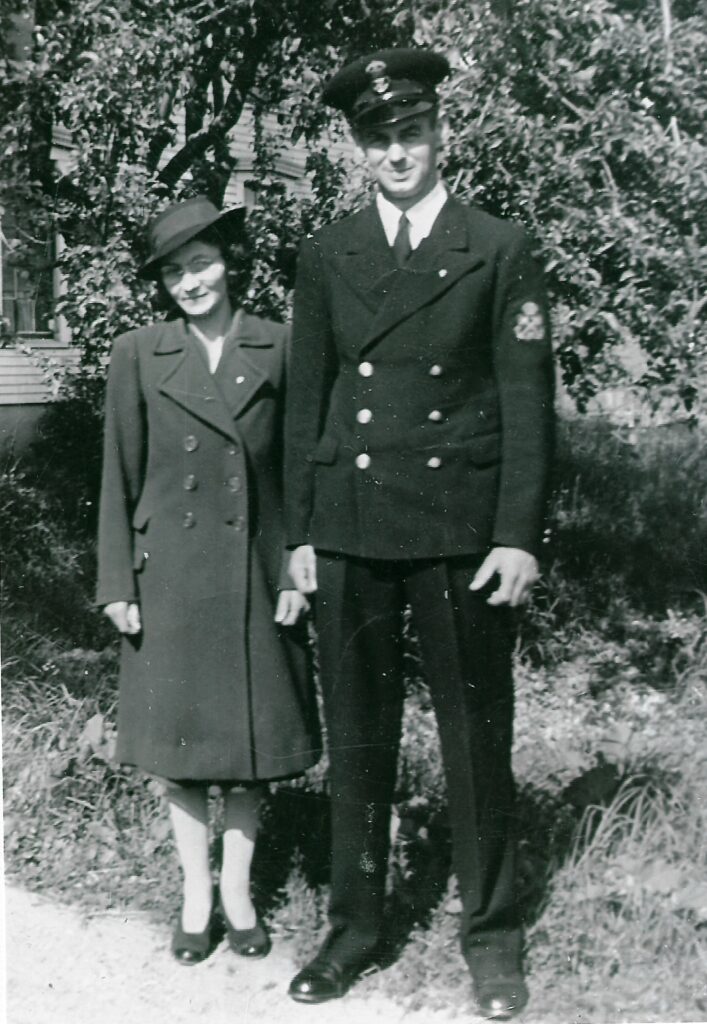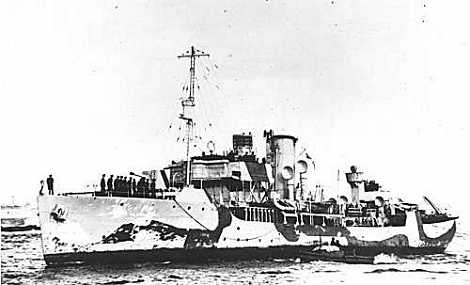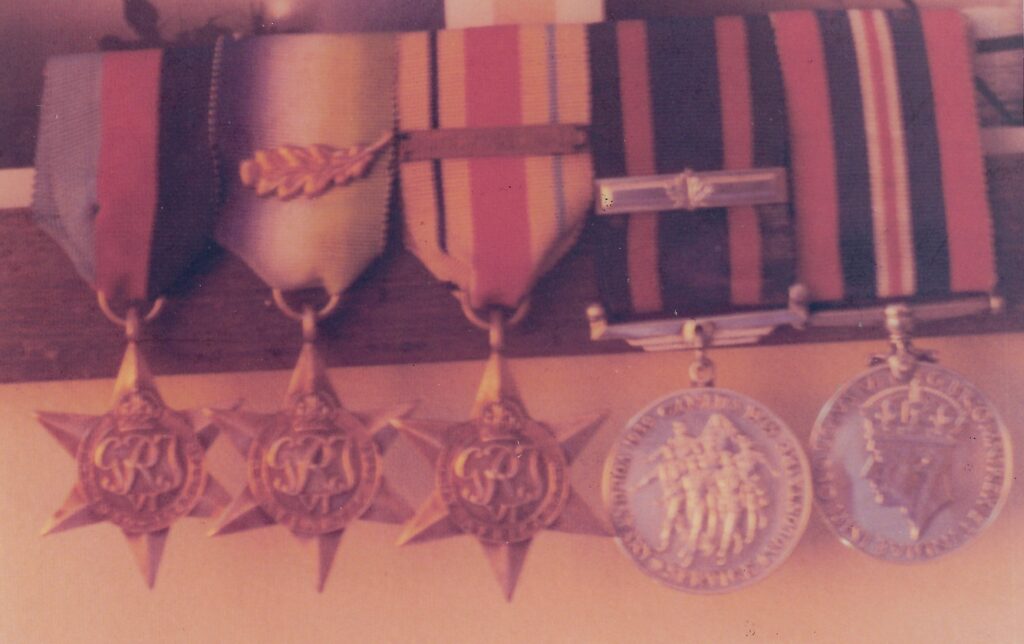Chief Petty Officer Frank Edward Newcomb of Hantsport served in the R.C.N. in World War II. He was born in Hantsport on April 21, 1904, son of Jedidiah Henry and Margaret (Davison) Newcomb. His grandfather was Jedidiah Ells Newcomb who came to Hantsport in 1860 from Cornwallis. On March 20, 1862, he married Rhoda Churchill, daughter of Ezra and Ann (Davison) Churchill. Ezra Churchill owned the Churchill Ship Yard.
Frank grew up in Hantsport; the Newcomb home was on the riverbank just above the wharf with a good view of the Avon River. The house is still there, used as an office for Minas Basin Pulp and Power Company, only now facing on Prince Street. When Frank was in High School in 1919 the FAVONIAN, the last sailing vessel to be built at Hantsport, was under construction and Frank tended the steam box used for bending the planks around the curves of the hull. He kept the fire going in the boiler to generate steam.
Two years after he graduated from high school, he went to New York and became a crew member on a United Fruit Company ship transporting bananas from South America to United States ports. He had worked his way up through the ranks to Third Mate. Frank had good eyesight. One day he was on watch on the bridge of the ship when he spotted an object some distance away. He called the Captain’s attention to check it. The Captain came with his binoculars and after a few minutes the Captain remarked,”That looks like a small boat.” The course of the ship was altered to investigate. The object turned out to be a lifeboat with one very hungry shipwrecked seaman aboard. The man was taken on board and taken to New York. Frank received a commendation for saving a life. An article in a New York paper headlined, “Nova Scotia Seaman Saves Life At Sea.”
In 1927 he married Estella Green. In 1930 when Frank retired from the sea, he came back to Hantsport and became the law enforcement officer for the town. Along with his policing duties he was also the caretaker of the school. He held the two positions until 1941.
World War II was declared in September 1939. On May 19, 1941 Frank went to Halifax and joined the Canadian Navy. He had a Third Mate’s ticket and was just past his 37th birthday. Eleven years had passed from the time that Frank stood watch on the bridge of a ship. When he presented his credentials to the recruiting officer, Frank was informed that he was too old and had too long a time ashore to receive a commission in the R.C.N. “That’s OK,” Frank replied. “There is a job to do and I am here to volunteer for that job. If I am too old for a commission, the lower decks don’t bother me a bit, so I might just as well start at the bottom. I am in good shape, my health is good , and my sea experience just might get some young officer out of trouble.” When the ink was dry on the application, Frank was a Petty Officer Second Class in the Canadian Naval Reserve, his service number being A4758.

After a few weeks of naval instruction, Frank received his first draft to a ship, H.M.C.S. SPIKENARD, one of the early Corvettes built in Canada for the British Navy. When they were completed in the late months of 1940, the British were short of men. Canadian crews were placed on all ten of the Corvettes and remained for the duration of hostilities. On his way to the jetty to join the ship, Frank sprained his ankle on uneven ground. When he reported on board he was informed by the Coxswain, “We can’t use you in your condition. I am sending you back for a healthy replacement.” Missing this ship was Frank’s lucky day. Ten days later the SPIKENARD was torpedoed and sunk south of Iceland by U-136. There were only eight survivors.
On July 22, 1941 a new Corvette, H.M.C.S. BRANDON, based at St. John’s, Newfoundland, was escorting convoys to and from Iceland. Before leaving Halifax, the Coxswain made up the watch list and found he was one leading Seaman short. He consulted with the Captain on which Able Seaman he could use to fill the gap. The Captain replied, “We don’t have much to pick from. There are a lot of new recruits with very little time at sea. However, I have watched the crew from time to time, and I think Newcomb would be a good choice. I know his rank is that of Petty Officer and he holds Third Mate’s ticket for the merchant service, so put him in charge of the third watch.”
The BRANDON served on the North Atlantic as an ocean escort. Her first convoy SC 46 left St. John’s Nfld. on September 26, 1941 for Londonderry. After this, with the exception of a few months for a refit at South Shields, the BRANDON ran almost continuously on the Newfie-Derry run. At the end of his first trip, Frank received his first promotion to Petty Officer, Seaman First Class.

During BRANDON’s first refit, a new radar was installed with the new SW19C antenna that looked like a fish bone, nicknamed by the crew as the “bed spring” at the top of the mast. The first time the ship encountered rough weather, the antenna broke loose of the bracket on the mast. The Captain sent for the Chief Engineer to see what could be done in the way of repairs. When the Chief looked over the tangled mess on the mast he informed the Captain, “There is no one from the engine room who could climb up to fix it in this storm. What did the Coxswain say?” “Well Chief,” replied the Captain, “he said the same thing.” The Captain turned to the Lookout on the bridge, “go get Newcomb.”
Frank had come off watch at 4 a.m. and was fast asleep when the Lookout came to the mess and shook the hammock and wakened him. He said, “The Captain wants you on the bridge. The radar antenna broke loose.” Frank replied, “OK.” Three-quarters of an hour later Frank arrived on the bridge and reported to the Captain who asked, “What kept you?” Frank answered, “If I have to climb up the mast in this weather I need nourishment.” “So be it,” replied the Captain, “Do what you have to do.” When Frank reported to the Captain that the antenna was secured, the Captain thanked him and said, “That is a mark in the book for you.”
A few weeks later the escort group left the British Isles with a west-bound convoy in poor weather. Two days later the wind rose to gale force, the seas were heavy and breaking over the vessel. The Captain noticed the ship was not coming up as fast as she should. He called to the engine room for the Chief Engineer. When the Chief came up he reported, “All the pumps are working. There seems to be too much water in the forward tank and the pumps will not clear it away.” About that time Frank appeared on the bridge. He had been down in the seamen’s mess in the forward part of the ship. He said, “Captain, I had an uneasy feeling the ship was not coming up.” The Captain replied, “I was just about to send for you. Now that you are here, see if you can find the problem.” Frank watched the seas break over the bow and come aft. He watched the bow of the ship go down into the trough and slowly come back. Every other wave would break over the bow of the ship and hundreds of gallons of seawater would head for the well deck, then back into the sea. Frank watched this for a few minutes, then a small wave came over and ran away quickly leaving the deck clear. Then he spotted the trouble. “I know what it is,” he told the Captain who was standing beside him. “For God’s sake, man tell me.” said the Captain. “Well, Captain, someone failed to carry out his duties when we were getting ready to go to sea. Whoever was responsible for putting the canvas covers on the pipes to the chain locker did not perform his duties.”
Now that the problem was partly solved, someone had to go out on the bow of the ship and plug the chain pipes. The Captain called for a volunteer. Some minutes went by, no-one came forth. Frank knew if the holes were not plugged to stop the water from going in the tanks the ship would take a dive and go to the bottom. “Well, someone has to go, so I will. I will need someone to tend the line behind me,” Frank said. A young Sub. Louie stepped forward. He had just joined ship that trip. He said, “I will go. What do we need?” Frank turned to a seaman who was on watch on the bridge and said, “Go to the rope locker and fetch two three-quarter inch lines about sixty or seventy feet long, and we need a bunch of Mae West life jackets.”
The men stripped off their clothes to their underwear, tied the rope around their waist, and put on a preserver. After studying the frequency of the waves, and where there was an object to hold onto when the wave came over, Frank put two life preservers over each arm and waited for the bow of the ship to come up. After the water ran away, the two men started forward on hands and knees as fast as they could go on the slippery deck. Frank had estimated he could reach the chain pipes before the next wave came over, and so they did, just in time to find hand-holds before the bow dipped down and another sea came over. When the deck cleared of water, Frank stuffed two of the Mae Wests down each pipe before the next wave. The next one was not quite as large as the first, and the men had ample time to get back. They were now safe, the task had been accomplished. After a few hours the pumps had cleared the water from the chain locker; the ship was now out of danger.
A week later the convoy had reached the meeting point where the ocean escorts were relieved by the local escorts for the rest of the trip to New York. The ocean escorts proceeded to St. John’s for a few days’ rest before taking another east-bound convoy to England. On the way in, the weather was a good deal better with no wind and a moderate Grand Bank swell. The Captain cleared lower decks and declared Petty Officer Seaman Frank Newcomb the ablest man onboard the ship, and every man on board this ship should personally thank him for saving his life.
A few trips later, the BRANDON left Londonderry with the escort force to escort another west-bound convoy. One day into the voyage she received orders to turn around and join up with a Mediterranean-bound convoy as a replacement. The ship made two more trips with this escort group to the Mediterranean. On one of these trips, when the ship was lying at the wharf at a port in Algeria, North Africa, one afternoon, the Captain and Frank were having a conversation on the bridge when several aircraft appeared, dropping bombs on ships in the harbor. They quickly manned the 20 mm gun on the off-shore side and shot down one of the planes. The Captain operated the gun and Frank looked after the ammunition.
Frank received his promotion to Chief Petty Officer in 1943. The BRANDON continued with her own escort group on the North Atlantic, escorting convoys from Newfoundland to England until February of 1945. She was in need of refit and came to Halifax. Frank left the ship for a thirty day leave. Three weeks into his leave, he received a letter from the drafting office to take another four weeks’ leave, then report to Captain D’s office at the dockyard for a new assignment.
At the end of April, when Frank reported to Captain D’s office he was informed he was going to another corvette on a special assignment. “We have checked your papers and noticed that before you joined up you worked in law enforcement as a policeman. The corvette we are sending you to has had a considerable amount of unrest and defaulters. Your job will be to find out the reason for all this trouble. Neither the Captain nor crew will know why you are coming aboard. I have sent a draft to the Captain to draft off the present Coxswain to another ship.
You will not report to anyone but this office on your findings. Carry on Chief.”
Three weeks later Frank reported to Captain D’s office. His report was very short. One part of the problem was already drafted off the ship. Replace the First Officer and the situation should be back to a good working and happy ship.” Frank remained in the crew for one more trip, then received his discharge from the navy.
On January 1, 1944, this message came on board the ship: Chief Petty Officer Frank Newcomb R.C.N.V.R. of Hantsport, N.S. has been mentioned in dispatches on the King’s New Year’s Honor List. This Chief Petty Officer has displayed unfailing zeal, fine seamanship, and devotion to duty while serving in one of His Majesty’s Canadian Corvettes in the North Atlantic and Mediterranean.

After Frank received his discharge from the Navy he came back home to his former position as law-enforcement officer, and caretaker of the school. When he found the school required a teacher for the Industrial Arts Department, he promptly volunteered to fill in until a teacher was found. He held the position until the end of June when school closed for the summer.
He carried on as town policeman until the summer of 1946. He was requested to attend a Town Council Meeting to explain the reason for failing to give tickets to car drivers who were going through stop signs without stopping. The Mayor said he had given only three tickets in the last two months. Frank replied, “That’s right. I was in the right place at the right time and wrote them a ticket. I know of others in the town who regularly break the law by going through stop signs, and mark my word, in time I will be in the right place at the right time to write them a ticket. That is all I have to say.” Frank turned and walked to the door. He put his hand on the door knob and turned to face the Council and asked, “Does that include everyone in this room?” The Mayor answered, “By all means. Any citizen of the town, including the ones in this room.” Frank thanked the Mayor and left. The next day at noon Frank was at the corner of Prince and Main Street. He had left the school early and gone home to change into his police uniform. A car came up Prince Street, went through the stop sign without stopping. Frank knew the car belonged to the Mayor. He put up his hand for the car to stop. The Mayor pulled over to the side of the road and put the window down, saying, “Anything wrong, Chief?” “Not really,” replied Frank. “Well why did you stop me then?” “You just drove through that stop sign. Now I am going to write you a ticket.” “But Chief, do you think ° you are doing the right thing, giving a minor traffic ticket to the chief magistrate of the town?” “I most certainly do,” replied Frank. “When I left the council meeting last night the last words you said to me were if I caught anyone going through a stop sign I should write them a ticket, so here it is. Take it to the town hall and pay it.” The Mayor informed Frank. he was going to fight the ticket. Frank replied, “That is all right. You do whatever you have to but remember, Mr. Mayor, you broke the law.”
The next day Frank went to the Town Hall and resigned as the law enforcement officer for the town. He stayed on as the school custodian for the rest of his working life. He retired in 1969.
St. Clair H. Patterson
President Lucknow Branch 109 R.C.L.
Hantsport, N.S.
